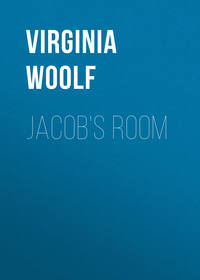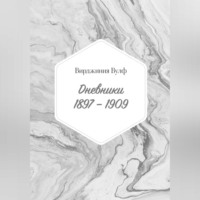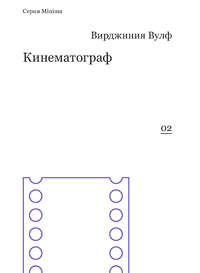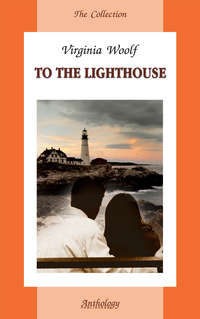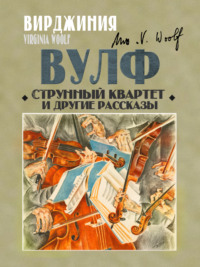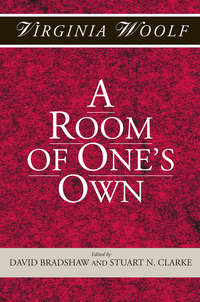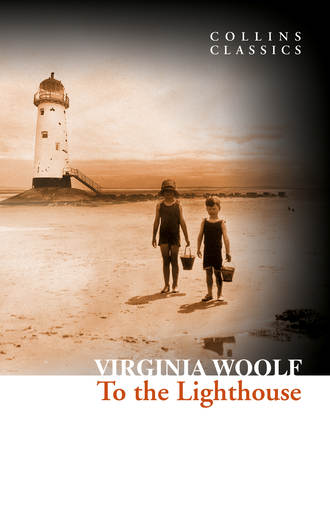
Полная версия
To the Lighthouse

TO THE LIGHTHOUSE
Virginia Woolf

Contents
Title Page
History of Collins
Life & Times
Bibliographical Note
Chapter 1: The Window
Chapter 2: Time Passes
Chapter 3: The Lighthouse
Classic Literature: Words and Phrases adapted from the Collins English Dictionary
Copyright
About the Publisher
History of Collins
In 1819, millworker William Collins from Glasgow, Scotland, set up a company for printing and publishing pamphlets, sermons, hymn books, and prayer books. That company was Collins and was to mark the birth of HarperCollins Publishers as we know it today. The long tradition of Collins dictionary publishing can be traced back to the first dictionary William published in 1824, Greek and English Lexicon. Indeed, from 1840 onwards, he began to produce illustrated dictionaries and even obtained a licence to print and publish the Bible.
Soon after, William published the first Collins novel, Ready Reckoner; however, it was the time of the Long Depression, where harvests were poor, prices were high, potato crops had failed, and violence was erupting in Europe. As a result, many factories across the country were forced to close down and William chose to retire in 1846, partly due to the hardships he was facing.
Aged 30, William’s son, William II, took over the business. A keen humanitarian with a warm heart and a generous spirit, William II was truly ‘Victorian’ in his outlook. He introduced new, up-todate steam presses and published affordable editions of Shakespeare’s works and The Pilgrim’s Progress, making them available to the masses for the first time. A new demand for educational books meant that success came with the publication of travel books, scientific books, encyclopedias, and dictionaries. This demand to be educated led to the later publication of atlases, and Collins also held the monopoly on scripture writing at the time.
In the 1860s Collins began to expand and diversify and the idea of ‘books for the millions’ was developed. Affordable editions of classical literature were published, and in 1903 Collins introduced 10 titles in their Collins Handy Illustrated Pocket Novels. These proved so popular that a few years later this had increased to an output of 50 volumes, selling nearly half a million in their year of publication. In the same year, The Everyman’s Library was also instituted, with the idea of publishing an affordable library of the most important classical works, biographies, religious and philosophical treatments, plays, poems, travel, and adventure. This series eclipsed all competition at the time, and the introduction of paperback books in the 1950s helped to open that market and marked a high point in the industry.
HarperCollins is and has always been a champion of the classics, and the current Collins Classics series follows in this tradition – publishing classical literature that is affordable and available to all. Beautifully packaged, highly collectible, and intended to be reread and enjoyed at every opportunity.
Life & Times
Mental Health and Creativity
It would be fair to say that Virginia Woolf was an intense and complex personality. Some might describe her as highly imaginative, sensitive and creative, while others might use the words high-maintenance, introspective and obsessive. In truth, she was all of the above, which meant that she was highly regarded as a novelist by many and entirely disregarded by others.
The central sticking point with the latter was that she came from a highly privileged, upper-middle-class background, yet she viewed the world in quite a negative light. Untroubled by the daily pressures of most, her time was spent in deep analysis of life – or rather, her own life and that of her friends and family. Her literature, therefore, could occasionally disconnect with the lay reader, because her concerns could be seen as self-indulgent and focused on a rarified environment to which most people were not privy.
As a human specimen, Woolf was not a very robust figure. She was prone to bouts of depression and breakdown, in part possibly brought on by the lack of any necessity to just get on with activities that were positive for her mental and physical constitution. In the absence of responsibilities to toughen the character, she lived in a world of ever-decreasing circles until, one day, her horizons closed in so tight that she chose suicide as a means of escape. She filled the pockets of her overcoat with pebbles and walked headlong into a river to drown her sorrows, quite literally. Her life was ended by her own thoughts and actions at the age of 59.
Woolf is a classic case of an artist whose creative expression was bad for their health. Had she abandoned writing in favour of an occupation that took her mind away from her obsessive thoughts, she would undoubtedly have lived a happier and more fulfilled life, but instead she became the author of her own undoing. So, a weighty question remains: was it worth all the pain and suffering? Inevitably those with similar leanings will say yes, because they are able to identify with Woolf’s desire to commit her thoughts to the written word as a kind of catharsis. Inevitably those who cannot identify will say no, because her work offers nothing to which they can relate as they have no need of therapy. It may be that there has never been a more divisive novelist in the history of English literature, and this is probably Woolf’s most interesting aspect.
Woolf’s main influence on modern literature was her ‘stream of consciousness’ approach to prose. Her novels were really vehicles for the copious current of thoughts and emotions to flow without parameters. She was an aesthete and intelligentsium, investing all of her mental capacity into understanding and disseminating the minutiae of human nature, human society, human culture and the human condition. Woolf and her set could be seen as looking down on those who chose not to analyse human existence in such microscopic detail, but realistically this was probably the result of insecurities about one’s own talent, context and significance. The one thing that is certain about belief systems is that believing things doesn’t make them true. This is certainly not to say that Woolf’s portfolio has no value – far from it – but that we do well to remember the context of the author. After all, it was precisely because she existed in her particular milieu that she produced her pioneering style of literature. Moreover, had she been born into a more typical, lower-middle or working class background, she would probably not have had the wherewithal to dissect humanity to such a level.
Mrs Dalloway and To the Lighthouse
Virginia Woolf’s prolific patch continued in 1925 and 1927, when she published Mrs Dalloway and then To the Lighthouse. In these two novels, she displays the kind of original approach to prose that would forge her reputation as a literary genius. Woolf experimented with innovative approaches to writing that set her apart from her contemporaries by largely abandoning plot in favour of psychological exploration. She made it her mission to delve into the human condition – something most people took so much for granted that they failed to consider its importance.
Of course, this approach didn’t make her books easy to read, but the whole point of the method was to challenge literary norms. Just as one needed to apply effort to understand the work of the Cubist artistic movement, which was prevalent at that time, so Woolf published literature with a similar requirement for analysis. She had turned the novel into high art. This wasn’t to everyone’s taste, but it would inevitably prove very influential. It was a sea change in defining the purpose of the novel, as the author was no longer expected to take the work to the reader. Instead, the reader was expected to do their own work and accept the challenge of interpreting a text’s meaning. It was an intellectual workout on offer, rather than an unthinking stroll. Inevitably, this catalysed a division within the realm of the novel, as it divided into the ‘literary novel’ and the ‘commercial novel’. The landscape of fiction publishing had been irreversibly altered by progress, and Woolf was at the forefront of the march to modernity.
The surface plot for Mrs Dalloway is simply that Clarissa Dalloway is preparing to host a party in the evening. But beyond the surface, Woolf explores the thought processes of Mrs Dalloway as she is prompted to reflect on her life and past events. Central to the novel is reference to the effect of World War I on British society in the post-war years and, in particular, the loss of loved ones and the altering fate of those left behind. The consequences of this included the physical and psychological damage done to those who fought and survived, as well as to those who survived despite never having set foot on the battlefield. It all adds up to an odd juxtaposition of people carrying on their lives, with parties, families and friends, while an unspoken suffering erodes their happiness.
The chronology of To the Lighthouse brackets World War I, examining the societal transformation caused by the conflict. The eponymous lighthouse is the summer home of the Ramsay family, on the Isle of Sky, in the Hebrides archipelago, off Scotland. The dynamic of the social environment inevitably changes year after year, but the war causes an abrupt change, due in part to the hiatus, but also due to three deaths – one from old age, one from combat and one from complications in childbirth. The use of the lighthouse is, of course, symbolic as a metaphorical guiding light that leads people to safety in life’s travels. Despite the turbulence that life has wrought on the surviving members of the family, they manage to maintain the notion that meeting at the island provides them with a sense of insight and contentment that their world would otherwise lack.
Woolf’s general take on society and the individual lives of her characters has an air of the upper-middle class about it, as those are the people seen to throw parties and have holiday homes, but this doesn’t detract from the weight of her prose or to remove her meaning from the reaches of other readers. This is because she uses these characters as devices to bring protagonists together in order to investigate the interaction of personality with great skill.
The Bloomsbury Set
Virginia Woolf came from a background of intellectualism, however, this was largely cemented by her family’s relocation from Kensington to Bloomsbury, where she became part of an intellectual elite known as the Bloomsbury Set. Together, they were all goldfish in the same bowl, looking out at the world around them with a similar artistic palette.
The pretentions of her social group actually allowed her to blossom as a writer, because she was given the encouragement and freedom she needed to experiment with her prose. In short, she was allowed to think of herself as an author and she was told what she wanted to hear. This was vitally important to someone with nagging self-doubt, so she developed deep and lasting bonds with those who saw and nurtured her potential. Indeed, she married one of them – Leonard Woolf – and remained devoted to him.
In time, of course, the pretentions of the Bloomsbury Set transcended into success, as they were undoubtedly intelligent, talented and well educated. This process of ascendance was, in part, aided by a number of stunts designed to draw public attention. One stunt in particular has become famous for its daring and humour: the Dreadnought Hoax. This was an elaborate plan to gain egress to the battleship HMS Dreadnought for no other reason than to have a good look around. A number of the Bloomsbury Set, including Woolf, disguised themselves as Abyssinian princes. They wore the appropriate garb of robes and turbans, but they also ‘blacked-up’ and sported fake beards. With escort and interpreter in tow, they boarded a VIP coach and took a train from Paddington to Weymouth, where they were received as genuine royalty with honour guard and allowed to inspect Royal Navy fleet. All the while, they pretended to communicate in a foreign tongue by uttering gibberish furnished with Greek and Latin, which the interpreter duly pretended to understand and translate.
Having returned to London, a photograph of the Bloomsbury Set, still in character, was sent to the Daily Mirror newspaper and the hoax was revealed. Not surprisingly, the affair turned into a scandal. The Foreign Office and the Royal Navy were the target of a great deal of finger-pointing, partly in fun and partly in seriousness for allowing such a blatant lapse in national security. The situation wasn’t helped by the fact that the Bloomsbury Set were pacifists, which only served to rub salt into the wound. When the Navy high command pushed to have the perpetrators punished, they found themselves powerless to do anything. For one thing, no laws were broken, and secondly the consensus was that they themselves should be punished for allowing themselves to be beguiled by such a lame practical joke.
Needless to say, the Dreadnought Hoax planted the Bloomsbury Set in the public consciousness once and for all, as the oxygen of publicity was theirs to breathe in and enjoy. The hoax occurred on 7 February, 1910. Woolf’s first novel was begun the same year, although she did not publish until 1915, by which time she was already a minor celebrity.
Despite her subsequent success, Woolf was never particularly contented, however, for she had such a troubled soul and indefatigable mind. Today her malady would, doubtless, be described as a bipolar condition, for she oscillated from exuberant mood highs to despairing clinical lows. In the end, she was convinced that she would never come full circle again, so she decided to cut her loses while in the grip of a crushing depression that rendered her unable to see any light at the end of the tunnel. Virginia Woolf died in 1941, leaving behind a highly respected, progressive and considerable canon of essays, critique and novels.
Bibliographical Note
The following is a list of abbreviated titles used in this edition.
MS: To the Lighthouse: The Original Holograph Draft, transcribed and ed. Susan Dick (Toronto University Press, 1982; Hogarth Press, 1983). Square brackets are used to indicate words deleted in original draft.
TL: To the Lighthouse, first British edn (Hogarth Press, 5 May 1927).
Moments of Being: Moments of Being: Unpublished Autobiographical Writings of Virginia Woolf, ed. Jeanne Schulkind (Chatto & Windus, 1976).
Diary: The Diary of Virginia Woolf, 5 vols., ed. Anne Olivier Bell (Hogarth Press, 1977; Penguin Books, 1979).
Letters: The Letters of Virginia Woolf, 6 vols., ed. Nigel Nicolson and Joanne Trautmann (Hogarth Press, 1975–80).
Essays: The Essays of Virginia Woolf, 3 vols. (to be 6 vols.), ed. Andrew McNeillie (Hogarth Press, 1986).
CE: Collected Essays, 4 vols., ed. Leonard Woolf (Chatto & Windus, 1966, 1967).
Mausoleum: Sir Leslie Stephen’s Mausoleum Book (1895), introduced by Alan Bell (OUP, 1977).
CHAPTER 1
The Window
I
‘Yes, of course, if it’s fine tomorrow,’ said Mrs Ramsay. ‘But you’ll have to be up with the lark,’ she added.
To her son these words conveyed an extraordinary joy, as if it were settled the expedition were bound to take place, and the wonder to which he had looked forward, for years and years it seemed, was, after a night’s darkness and a day’s sail, within touch. Since he belonged, even at the age of six, to that great clan which cannot keep this feeling separate from that, but must let future prospects, with their joys and sorrows, cloud what is actually at hand, since to such people even in earliest childhood any turn in the wheel of sensation has the power to crystallise and transfix the moment upon which its gloom or radiance rests, James Ramsay, sitting on the floor cutting out pictures from the illustrated catalogue of the Army and Navy Stores, endowed the picture of a refrigerator as his mother spoke with heavenly bliss. It was fringed with joy. The wheelbarrow, the lawn-mower, the sound of poplar trees, leaves whitening before rain, rooks cawing, brooms knocking, dresses rustling – all these were so coloured and distinguished in his mind that he had already his private code, his secret language, though he appeared the image of stark and uncompromising severity, with his high forehead and his fierce blue eyes, impeccably candid and pure, frowning slightly at the sight of human frailty, so that his mother, watching him guide his scissors neatly round the refrigerator, imagined him all red and ermine on the Bench or directing a stern and momentous enterprise in some crisis of public affairs.
‘But,’ said his father, stopping in front of the drawing-room window, ‘it won’t be fine.’
Had there been an axe handy, a poker, or any weapon that would have gashed a hole in his father’s breast and killed him, there and then, James would have seized it. Such were the extremes of emotion that Mr Ramsay excited in his children’s breasts by his mere presence; standing, as now, lean as a knife, narrow as the blade of one, grinning sarcastically, not only with the pleasure of disillusioning his son and casting ridicule upon his wife, who was ten thousand times better in every way than he was (James thought), but also with some secret conceit at his own accuracy of judgement. What he said was true. It was always true. He was incapable of untruth; never tampered with a fact; never altered a disagreeable word to suit the pleasure or convenience of any mortal being, least of all of his own children, who, sprung from his loins, should be aware from childhood that life is difficult; facts uncompromising; and the passage to that fabled land where our brightest hopes are extinguished, our frail barks founder in darkness (here Mr Ramsay would straighten his back and narrow his little blue eyes upon the horizon), one that needs, above all, courage, truth, and the power to endure.
‘But it may be fine – I expect it will be fine,’ said Mrs Ramsay, making some little twist of the reddish-brown stocking she was knitting, impatiently. If she finished it tonight, if they did go to the Lighthouse after all, it was to be given to the Lighthouse keeper for his little boy, who was threatened with a tuberculous hip; together with a pile of old magazines, and some tobacco, indeed whatever she could find lying about, not really wanted, but only littering the room, to give those poor fellows who must be bored to death sitting all day with nothing to do but polish the lamp and trim the wick and rake about on their scrap of garden, something to amuse them. For how would you like to be shut up for a whole month at a time, and possibly more in stormy weather, upon a rock the size of a tennis lawn? she would ask; and to have no letters or newspapers, and to see nobody; if you were married, not to see your wife, not to know how your children were, – if they were ill, if they had fallen down and broken their legs or arms; to see the same dreary waves breaking week after week, and then a dreadful storm coming, and the windows covered with spray, and birds dashed against the lamp, and the whole place rocking, and not be able to put your nose out of doors for fear of being swept into the sea? How would you like that? she asked, addressing herself particularly to her daughters. So she added, rather differently, one must take them whatever comforts one can.
‘It’s due west,’ said the atheist Tansley, holding his bony fingers spread so that the wind blew through them, for he was sharing Mr Ramsay’s evening walk up and down, up and down the terrace. That is to say, the wind blew from the worst possible direction for landing at the Lighthouse. Yes, he did say disagreeable things, Mrs Ramsay admitted; it was odious of him to rub this in, and make James still more disappointed; but at the same time, she would not let them laugh at him. ‘The atheist’, they called him; ‘the little atheist’. Rose mocked him; Prue mocked him; Andrew, Jasper, Roger mocked him; even old Badger without a tooth in his head had bit him, for being (as Nancy put it) the hundred and tenth young man to chase them all the way up to the Hebrides when it was ever so much nicer to be alone.
‘Nonsense,’ said Mrs Ramsay, with great severity. Apart from the habit of exaggeration which they had from her, and from the implication (which was true) that she asked too many people to stay, and had to lodge some in the town, she could not bear incivility to her guests, to young men in particular, who were poor as church mice, ‘exceptionally able’, her husband said, his great admirers, and come there for a holiday. Indeed, she had the whole of the other sex under her protection; for reasons she could not explain, for their chivalry and valour, for the fact that they negotiated treaties, ruled India, controlled finance; finally for an attitude towards herself which no woman could fail to feel or to find agreeable, something trustful, childlike, reverential; which an old woman could take from a young man without loss of dignity, and woe betide the girl – pray Heaven it was none of her daughters! – who did not feel the worth of it, and all that it implied, to the marrow of her bones.
She turned with severity upon Nancy. He had not chased them, she said. He had been asked.
They must find a way out of it all. There might be some simpler way, some less laborious way, she sighed. When she looked in the glass and saw her hair grey, her cheek sunk, at fifty, she thought, possibly she might have managed things better – her husband; money; his books. But for her own part she would never for a single second regret her decision, evade difficulties, or slur over duties. She was now formidable to behold, and it was only in silence, looking up from their plates, after she had spoken so severely about Charles Tansley, that her daughters – Prue, Nancy, Rose – could sport with infidel ideas which they had brewed for themselves of a life different from hers; in Paris, perhaps; a wilder life; not always taking care of some man or other; for there was in all their minds a mute questioning of deference and chivalry, of the Bank of England and the Indian Empire, of ringed fingers and lace, though to them all there was something in this of the essence of beauty, which called out the manliness in their girlish hearts, and made them, as they sat at table beneath their mother’s eyes, honour her strange severity, her extreme courtesy, like a Queen’s raising from the mud a beggar’s dirty foot and washing it, when she thus admonished them so very severely about that wretched atheist who had chased them to – or, speaking accurately, been invited to stay with them in – the Isle of Skye.
‘There’ll be no landing at the Lighthouse tomorrow,’ said Charles Tansley, clapping his hands together as he stood at the window with her husband. Surely, he had said enough. She wished they would both leave her and James alone and go on talking. She looked at him. He was such a miserable specimen, the children said, all humps and hollows. He couldn’t play cricket; he poked; he shuffled. He was a sarcastic brute, Andrew said. They knew what he liked best – to be for ever walking up and down, up and down, with Mr Ramsay, and saying who had won this, who had won that, who was a ‘first-rate man’ at Latin verses, who was ‘brilliant but I think fundamentally unsound’, who was undoubtedly the ‘ablest fellow in Balliol’, who had buried his light temporarily at Bristol or Bedford, but was bound to be heard of later when his Prolegomena, of which Mr Tansley had the first pages in proof with him if Mr Ramsay would like to see them, to some branch of mathematics or philosophy saw the light of day. That was what they talked about.


